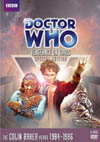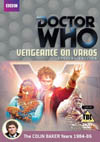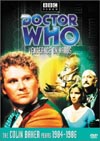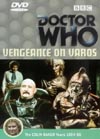Special Edition DVD Extras include:
Doctor-less Satire"Vengeance on Varos" jumps eagerly into both of the major story structure problems of season 22. I will continue to automatically refer to the 25-minute international versions of this season's episodes, especially since it really highlights those problems in the writing. First off, it takes the Doctor and Peri all of the first half-hour episode just to begin to get to the scene of the action. They just barely get around to landing the TARDIS, and as the Doctor peers at the view screen muttering, "Who's this coming to welcome us?", we cut to the credits. Although he and Peri got some decent scenes in the TARDIS, these should ideally be packed up near the beginning of the episode, leaving more time for them to involve themselves in the scenes on Varos.And one of the bizarre things about the scenes on Varos is that they are actually at their highest quality in the opening half-hour episode, during the long sequence of exposition of the colony's social structure and conflicts, while the Doctor is nowhere around. This is where the most interesting characters of Varos define themselves and make most obvious the nature of the satire that the story wants to draw attention to. The television medium itself is scrutinized here, and very nicely done through the two "viewers at home" characters of Etta and Arak This scrutiny can be seen as simply attempting to promote anti-violence on its most basic level, which doesn't work too well as it's yet another hypocritical re-run of what we already got in "Warriors of the Deep" (story no. 131), "Resurrection of the Daleks" (story no. 134), "Attack of the Cybermen" (story no. 138), etc. Does it matter if it ends on Varos, after these four episodes are over? Next story, we'll no doubt be back to tackling it again. But Varos has a much more interesting deeper layer, which is that all this video violence is a means for those in power to distract the populace into continuing to accept their financially exploitive rule. The web of characters created to flesh this out are really nicely written and portrayed on screen, from Martin Jarvis's puppet Governor, to Nabil Shaban's alien merchant Sil, to the corrupt Chief Officer, to the suggestive video technician Bax. Roping viewers Arak and Etta into the mix via instant voting gives this story a marked uniqueness amongst other adventures that might tackle similar themes. Even the short scene in the cell between the guard Rondel and the rebel's wife Aretta adds nicely to the critical picture being painted here. The Doctor has a great contribution to make to Varos, supposedly, which would actually have been an excellent way to use his character. However, the script never figures out how to really engage him in that process. Instead, it engages the Doctor nearly full time in distractions instead, and REALLY leaves these portions "empty", although several cool video effects sequences breathe a bit of life into these sections. What we don't get nearly enough of is the Doctor actually investigating the truth of Varos. Philip Martin reveals the truth in Doctor-less expositional character scenes instead. And pretty much all of the Doctor's scenes of making his great contribution are in a relatively short and poorly plotted sequence. Character motivations make little sense here, while the Doctor's strategies are all over the place and feel ineffective, and as such the actors' charisma levels tend to drop a bit below par here.
Structure Falling ApartThe biggest fault of the story's structure becomes obvious when you examine where it leaves off after three of the four half-hour episodes have finished. Although I'll save the full details and spoilers for the in-depth analysis version of this review, I can say that we get to a point where, with 20 odd minutes still ahead of us, one has to wonder where this story has left to go? Can you spell "anti-climax"?The structural problems of the story are even more bizarre due to the fact that this story was originally commissioned during previous years for the four 25-minute episode format, and was reportedly "working" when they had to change it for the two 45-minute episodes. Personally, I think if it really was working as a four-parter, no changes should have been required. Just put two 25-minute episodes together and presto; there's your double-length episode, done! It worked for "Resurrection of the Daleks", and it works for almost every movie compilation I've ever seen. (The big exceptions may be over-padded six-parters, like Patrick Troughton's "The Seeds of Death".) But you have to really wonder if the original four-part script was actually working, especially since it didn't have Arak and Etta viewing everything from at home. Good thing they added them. Thankfully, many of the guest characters still get some really good, worthwhile scenes in part four. Martin Jarvis's Governor character works quite well, and manages to become quite sympathetic. Thus this easily becomes Jarvis's definitive role on Doctor Who, overshadowing his unrecognizable costume-spectacle portrayal of Hilio in "The Web Planet" (story no. 13) and his eternally hidden scientist character in "Invasion of the Dinosaurs" (story no. 71). Nabil Shaban put a ton of energy into his portrayal of the alien Sil, quickly turning him into the signature villain of the piece, and having so much fun that it's hard not to want to laugh along with him. Quillam is pretty much a useless character in the story, perhaps designed as a kind of Sharaz Jek / Weng-Chiang wannabe and really not living up to the hype. He is more of a dull, known quantity, best passed by quickly.
For Musical EffectThe Colin Baker era features some great music from the BBC Radiophonic Workshop, which the BBC has been quite negligent in marketing successfully. Jonathan Gibbs does some really nice work for this story. Even though it may seem simple, the composition perfectly punctuates on-screen actions and helps build tensions during countless key moments, and instrument choices work extremely well. Of course, there are a couple of cheesy moments you can focus on if you're the type to do so, but for the bulk of this score that really works well, I'd have to rank it as the second most desirable to collect from the six scores from this season. So it really was sad that it has neither made it to CD, nor, as far as I can tell, been included separately on the original DVD's specially produced "production sound" audio track. Weird. And most disappointing. I would have eagerly bought that DVD soon after it came out had it featured the usual isolated music track. The BBC lost another sale there. (Mind you, if they can produce a similar "production sound" audio track for Jon Pertwee's "The Mutants" (story no. 63), I'm there all the way. Another missed audio option would have been to include the German language track "Revolte auf Varos" from the 1995 VOX broadcast. That might have equally convinced me to buy the original DVD.)However, the people at the BBC seem to be coming up trumps with the new Special Edition DVD release, as we finally get the music tracks to make the exercise worthwhile. Nice! At least the story has some half decent laser effects - a stream of thankfully moving red dots from Dave Chapman, reminiscent of the effects in "The Keeper of Traken" (story no. 115), and probably bypassing a multitude of potential problems with the original footage that solid beams would have made obvious, mixing with a successful sound effect. Nice.
This story has become available on DVD and VHS video. Click on the Amazon symbol for the location nearest you for pricing and availability:
Comments on this article are welcome. You may contact the author from this page:
|
||||||||||||||||||||||||||||||||||||||||||||||||










